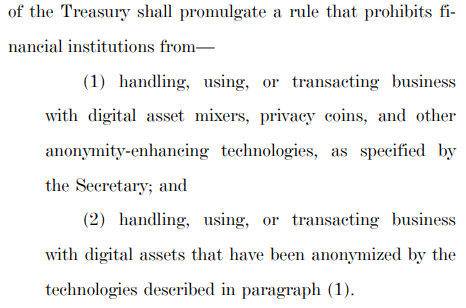Thread by Lyn Alden
- Tweet
- Dec 14, 2022
- #Politics #Tax #Cryptocurrency #Digitaleconomy
Thread
This bill would make writing open-source code for wallets, or running open-source nodes, something that only money services businesses can do.
It probably 1) won't pass and 2) probably won't withstand a 1st Amendment challenge if it does pass.
It probably 1) won't pass and 2) probably won't withstand a 1st Amendment challenge if it does pass.
But nonetheless, it's an important signal.
When it comes to financial privacy in particular, there have been various actions this year that show the "and then they fight you" stage is occurring.
When it comes to financial privacy in particular, there have been various actions this year that show the "and then they fight you" stage is occurring.
Warren doesn't care about people holding bitcoins in some custodial account.
What she cares about is 1) reducing financial privacy and 2) reducing the ability to self-custody assets. Those are the capabilities that she perceives as a threat.
What she cares about is 1) reducing financial privacy and 2) reducing the ability to self-custody assets. Those are the capabilities that she perceives as a threat.
It's inevitable that some governments will try to make peer-to-peer open-source value transfer networks follow the same KYC AML laws that banks do.
However, that's going to be very hard for them to do over the long run.
However, that's going to be very hard for them to do over the long run.
Mainly, it's easy for a government to enforce banks and other large businesses to follow certain rules.
But it's hard and expensive to enforce these types of things on the consumer level. There are orders of magnitude more enforcement points.
But it's hard and expensive to enforce these types of things on the consumer level. There are orders of magnitude more enforcement points.
It's one thing for a government to say, "banks can't send money to country xyz" or "banks have to get information xyz on their customers".
People put up with that, and often don't even know about it.
People put up with that, and often don't even know about it.
It's a very different thing for a government to say (and then try to enforce), "you're not allowed to write that type of open source code" or "you're not allowed to run that type of open source software on your own laptop".
Getting these types of technologies to comply with bank laws will be like when they tried to get automobiles to comply with horse-and-carriage laws.
And to even try, they have to get rather draconian/authoritarian in their laws and enforcement. "You can't run that free code".
And to even try, they have to get rather draconian/authoritarian in their laws and enforcement. "You can't run that free code".
Remember, physical cash is already a private medium of exchange. It used to be ubiquitous and normal, but as digital payments became commonplace, governments are clamping down on cash.
Their allowance for privacy is reducing.
Their allowance for privacy is reducing.
Privacy is increasingly being framed as abnormal; something only bad people want.
Keep in mind, privacy isn't just about privacy from governments. It's also about privacy from corporations, privacy from potential attackers and hacks, etc.
Keep in mind, privacy isn't just about privacy from governments. It's also about privacy from corporations, privacy from potential attackers and hacks, etc.
A big potential battle over the next decade will not likely be about what assets you can or cannot own, but rather, whether you are entitled to any privacy and whether you are entitled to custody your own assets.
Mentions
See All
Natalie Brunell @natbrunell
·
Dec 14, 2022
Excellent thread!

